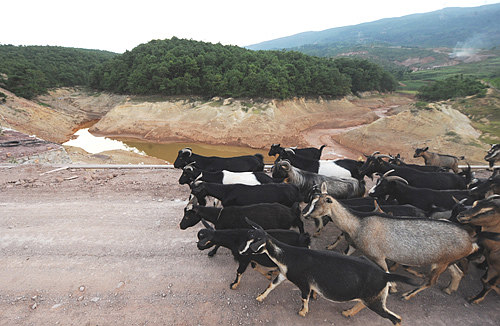|
 |
|
POLLUTED ENVIRONMENT: A flock of goats pass by the reservoir that has been polluted by the chromium compound waste dumped by Yunnan Luliang Chemical Industry Co. Ltd. (XINHUA) |
Education Opportunities
Statistics show the number of rural students studying in universities in China has been declining since the 1990s. The proportion of rural students at Peking University has declined from 30 percent to 10 percent. In 2010, only 17 percent of new students enrolled by Tsinghua University were from rural areas.
There are many reasons behind this. On one hand, urban citizens have far higher quality educational resources. Both in teaching staff and teaching facilities, urban areas are superior to rural areas. For a long time, rural schools have faced problems such as brain drain and shortage of facilities. On the other hand, most of the universities' recruitment entrance examinations favor students from urban areas, as urban middle schools are able to pay more attention to so-called "quality-oriented" education. Besides, preferential policies on college entrance examinations would sometimes lead to corruption during enrolling. Statistics show on most occasions urban students benefit better from those policies.
Therefore, changing the current situation and ensuring equal educational opportunities for both urban and rural students have become the priority on the agenda of China's education reform. Increasing investment for education in rural areas should be the focus of the reform and brooks no delay.
Since 2007, the Central Government has carried out the free education policy for normal university students, which aims to solve the existing problems. But a long-time process is needed because it takes nearly 10 years for a normal student to become a quality teacher. During this period, measures such as teacher exchanges and standardizing preferential policies on college entrance examinations should also be taken.
Xi'an Evening News
Slowing Down
The Ministry of Railways is preparing a new timetable to adjust the speed of trains. Now, all trains on high-speed tracks will run more slowly.
The slowing of bullet trains means a return to rationality, as well as a hard strategic choice. As everyone knows, the development of Chinese railways has been leaping forward since 1997. Since then accelerating speeds became an objective of Chinese railways, and in recent years high-speed trains finally started operations.
Compared to speed, safety is more important. The slowing of high-speed railways marks the end of the continuing effort to achieve ever higher speeds, and shows China's railways will prevent tragic accidents by abandoning the pursuit of high speed alone.
Today, we live in a time where speed is of the essence. Speed is one of the most distinct features. The worship of speed has become the motto of numerous officials. In this crazy adulation of speed, everything is linked to speed, and judged by speed. Over a night, factories occupy farmland, and skyscrapers are constructed in cities. But when quality and safety are forgotten, accidents would occur frequently.
The Central Government has realized the problem, stressing quality and safety are the top requirement of economic development. Only when combined with quality and safety, will speed benefit the people.
Yangcheng Evening News
Pollution Incident
On August 13, the government of Qujing City in southwest China's Yunnan Province announced pollution caused by a local chromium producer had killed 77 livestock from local villages.
The company, Yunnan Luliang Chemical Industry Co. Ltd., was said to have illegally dumped 5,222 tons of chromium compound waste, a highly toxic heavy metal, in three townships in Qujing City between the end of April and June.
The local government said no human casualties were reported, because the source of drinking water for villagers was far from dumping sites. Environmental departments continued to monitor soil pollution in these areas and no pollution was found in the nearby Nanpan River, the source of the Pearl River.
The accident was exposed on the Internet in early June. But the local government did not disclose any information about the serious pollution until the news was broadcast on the Internet and drew attention from the Yunnan and Guangdong environmental protection authorities.
The local governments are supposed to be active in releasing news to the public when serious environmental accidents happen. But, facing serious environmental accidents, many governments and companies are often reluctant to disclose information and even take measures to cover up the facts.
The urgent task for the local government is to disclose all information, including details, impact and treatment results. Furthermore, the local officials' duties should also be included in the disclosure. If they don't want to fully disclose the information, upper-level government has an obligation to force them to satisfy the public's rights to know.
The Beijing News
Power Abuses
On August 14, China Central Television reported Hao Pengjun, former Director of the Coal Industry Bureau of Puxian County in north China's Shanxi Province, was found to have acquired 305 million yuan ($44.66 million) by abusing his power and illegally running a coal mine business. Besides, he owned 35 apartments in Beijing and Hainan Province, the report said.
People wonder how a small-time local official could be so corrupt as to amass such a huge amount of ill-gotten money.
Lack of supervision may play an important role in this case. A local investigator said, during the time when Hao ran the illegal coal mine, people reported many of his illegal activities, but no action was taken by local government.
Today, Hao's corruption has been dealt with and he has been sentenced. What about those who protected and covered up for him? Will they be ferreted out and punished? It's a pity that up to today these questions have not been answered.
The situation is dangerous, because if those who provided Hao's protection cannot be uprooted, they may risk cultivating another stooge in order to gain illegal profit. Furthermore, their tricks will become more cunning and clandestine.
Xi'an Evening News | 